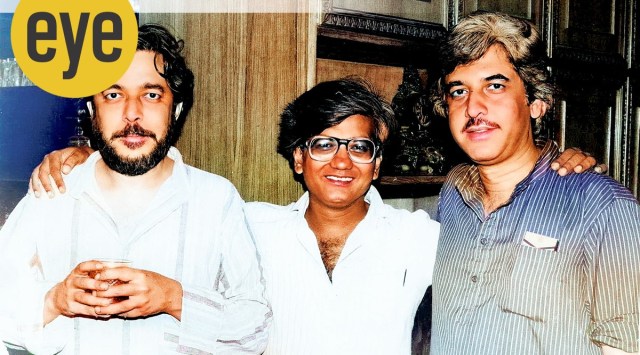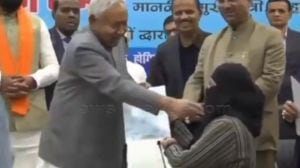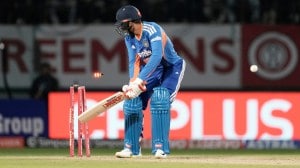Saeed Mirza’s I Know The Psychology of Rats is a touching eulogy to his late friend, filmmaker Kundan Shah, director of the cult classic Jaane Bhi Do Yaaro
The veteran screenwriter offers glimpses into Shah's artistic, intellectual and humane side, against a backdrop of political churn
 (Left to right) A young Saeed Mirza, Kundan Shah and scriptwriter Aziz Mirza. (Pic source: Express Archive)
(Left to right) A young Saeed Mirza, Kundan Shah and scriptwriter Aziz Mirza. (Pic source: Express Archive) I Know the Psychology of Rats by Saeed Mirza, a eulogy to his friend and colleague Kundan Shah, is a story of friendship, collaboration and trust against the backdrop of a society gradually manifesting its majoritarian identity through violence and coercion.
The book is an insight into the life and times of Kundan Shah and a narrative of his perspectives on issues of communalism, capitalism and Marxism. It is a book which lays bare the naked soul of Shah and reveals his artistic, intellectual and, most importantly, his humane side to us. For those of us who have seen and adored Shah’s chef-d’oeuvre Jaane Bhi Do Yaaro (1983), Mirza’s book is a must read as it is a revelation of his director friend and his intellect.
The book begins with an anecdote where Shah is trying to get rid of a rat which had ducked below his office cupboard. With a broom in hand, Shah had forced out the animal from its hiding and proudly claimed that he could do so effectively as ‘he knew the psychology of rats.’ The anecdote sets the tone of the manuscript, particularly for common readers like me who are interested in the views of intellectuals who could understand the psychology of “rats”, a metaphor which would be very handy in a country on the verge of a new ideological dawn. The understanding of the psychology of many such “rats” in our political and social lives could be crucial to our understanding of these times.
 For those of us who have seen and adored Shah’s chef-d’oeuvre Jaane Bhi Do Yaaro (1983), Mirza’s book is a must read as it is a revelation of his director friend and his intellect.
For those of us who have seen and adored Shah’s chef-d’oeuvre Jaane Bhi Do Yaaro (1983), Mirza’s book is a must read as it is a revelation of his director friend and his intellect.
This interesting book is genre-less. It is neither a complete tribute nor an absolute political commentary. Mirza’s narrative captures the electricity of the times which he and Shah spent at the Film and Television Institute in Pune. It talks about the Emergency and the resultant clampdown on freedom of expression. The landscape of the book is populated by many different characters, countless funny situations and heartbreaking moments which make you ponder and introspect. The narration wobbles between the past and the present. The past mainly has Shah and the present is written without him but with a lingering presence of his prophecies and observations.
Among all the descriptions of Shah’s bold unambiguous opinions, ranging from the Gujarat riots of 2002 to the candidature of Bernie Sanders as US President, one about the Babri Masjid is worthy of note. Mirza beautifully compares the judgments given in the case by the highest court of the land (in 2019) with the one given by Shah many years ago. Shah was of the opinion that no hospital or school should be constructed on the land where the Masjid had once stood. Instead, the Babri mosque should be built back, brick by brick, in slow motion, so that everyone gets the idea that a law has been broken. For me, it is the most beautiful statement of vindication of secularism in modern India.
It appears that a large part of the book has been conceived and penned by Mirza in Kashmir. This is the Kashmir post abrogation of Article 370 and Mirza writes, “… and here I am sitting on the patio of a houseboat in Kashmir on the Dal Lake and I shall pretend that everything is normal in this forsaken land. That’s what houseboats are for, aren’t they… to help you forget?” French psychiatrist Frantz Fanon had once written that the colonised man frees himself through violence. An artist colonised by sadness of the times probably frees himself through art. Mirza does exactly that. He writes that a great silence has descended upon his land. Nothing could have been more apt to describe our new India.
It would be unjust to talk about I Know the Psychology of Rats without mentioning the illustrations of the book by architect, artist and filmmaker Nachiket Patwardhan. Mirza’s kingdom of words has been decorated most prudently by Patwardhan. Each illustration is imaginative, precise and approbates the text. The book would have been incomplete without these.
I Know the Psychology of Rats is thus a book written for a friend, by a friend and reminds me of the Iranian movie, Where is the Friend’s House? (1987) by Abbas Kiarostami. It’s not just a tale of camaraderie between two friends who happen to share a common vision for their motherland, it’s a perspective of how friends learn, unlearn and relearn among themselves. In The Book of Embraces (1989), Eduardo Galeano writes that many small people, in small places, doing small things, can change the world. Mirza’s memoir gives us an impression that Shah, the filmmaker, tried to change the world through his cinema and his ideas. As Friedrich Nietzsche had said, the dancer has his ears in his toes, Shah had his ears to the soul of the nation. He heard and understood what many of us can’t.
In his poem The Cigarette Issue (in Book of Longing, 2006), Leonard Cohen says, “It’s not Greece any more, it’s India, the new place for unhappiness…” The poem breaks my heart. In 2022, India has truly become the new place of unhappiness. Mirza’s book prompted me to re-watch a couple of Shah’s movies. I also watched Argentinian filmmaker Fernando Solanas’ The Hour of the Furnaces (1968), which was one of the many wonderful movies which find mention in the book. At the end of it, I conclude that there is a price to becoming a man. I wish Shah was alive to show us the mirror. Probably he could have made another movie and called it, Jeene Bhee do Yaaro (Let us live, friends).
Dr. Shah Alam Khan is professor, department of Orthopaedics, All India Institute of Medical Sciences, New Delhi
- 01
- 02
- 03
- 04
- 05































